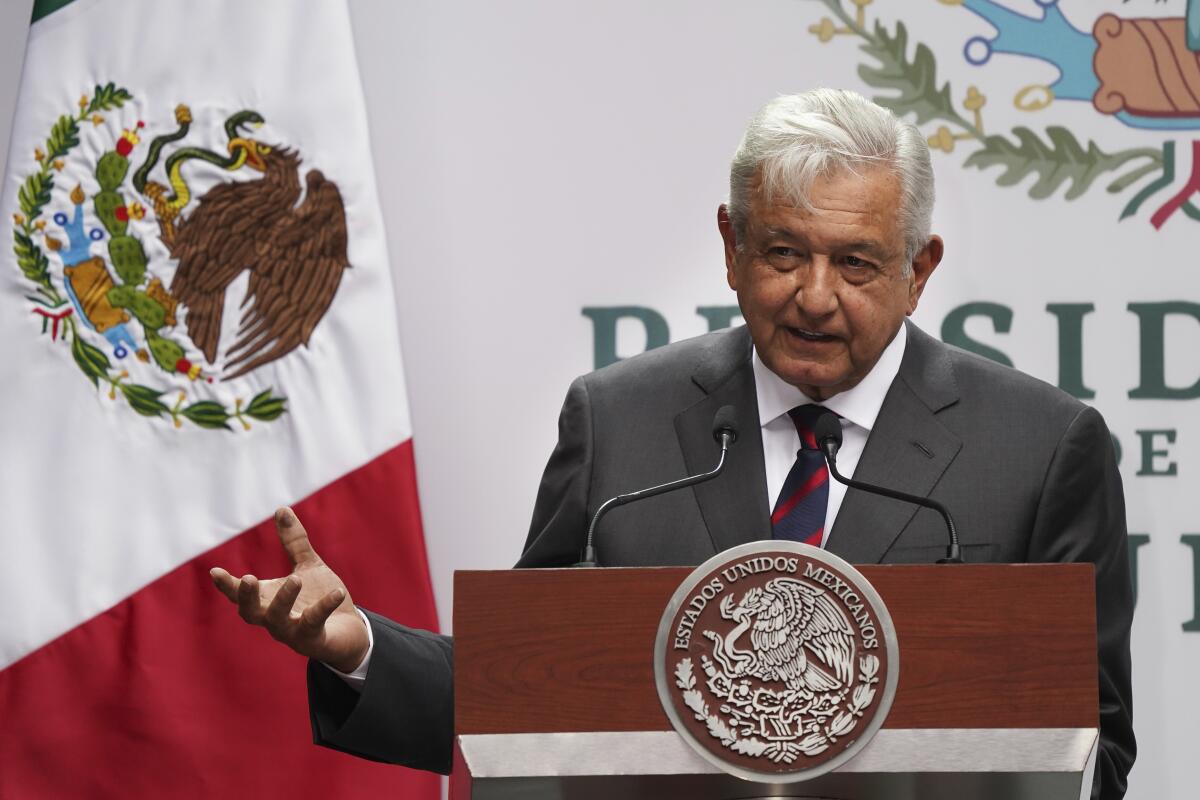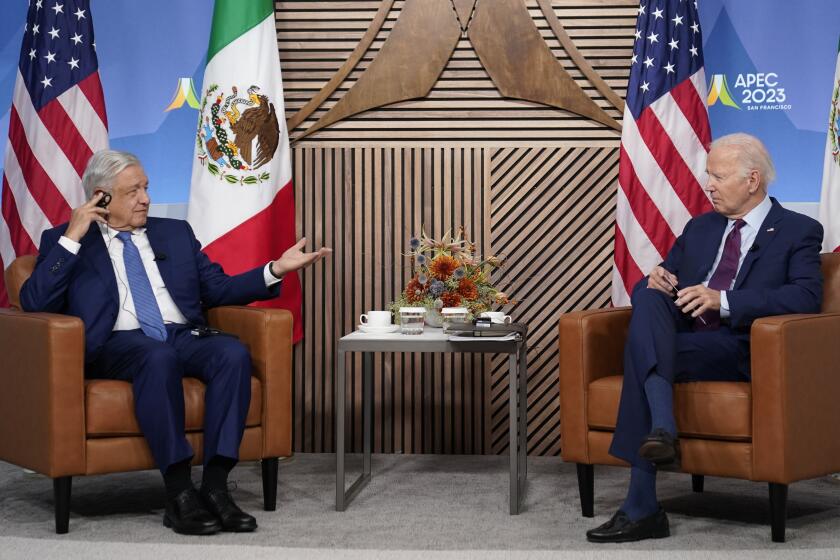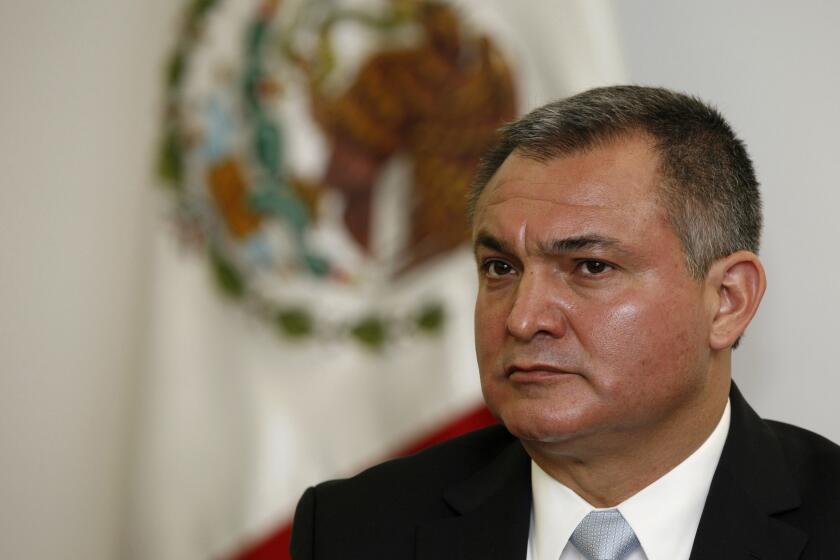Mexican president defends revealing U.S. reporter’s phone number, saying law doesn’t apply to him

- Share via
MEXICO CITY — Mexico’s president Friday defended his decision to disclose a U.S. reporter’s telephone number, saying a Mexican law that prohibits officials from releasing personal information doesn’t apply to him.
Press freedom groups said the president’s decision to make public the phone number of a New York Times reporter Thursday was an attempt to punish critical reporting, and exposed the reporter to potential danger.
Mexico’s law on the protection of personal data states that “the government will guarantee individuals’ privacy” and sets out pun-ishments for officials and others for “improperly using, taking, publishing, hiding, altering or destroying, fully or partially, personal data.”
President Andrés Manuel López Obrador said that “the political and moral authority of the president of Mexico is above that law,” adding that “no law can be above the sublime principle of liberty.” He also accused U.S. media of acting with “arrogance.”
He also downplayed the risks to journalists, saying it was “an old song that you [reporters] use to discredit our government,” and suggesting the New York Times reporter should just “change her telephone number.”
Andrés Manuel López Obrador denied allegations contained in U.S. media report about a U.S. inquiry into accusations close associates took drug money.
Mexico is one of the deadliest places in the world for reporters outside of war zones. The Committee to Protect Journalists, or CPJ, has documented the killings of at least 55 journalists in Mexico since 2018, when López Obrador took office.
Jan-Albert Hootsen, the Mexico representative for the CPJ, noted that the publication of a reporter’s phone number in Mexico can be dangerous. “The vast majority of threats and harassment and intimidation that reporters in this country, both foreign and domestic, receive, are conveyed through messages on messaging apps to mobile phones,” Hootsen said.
The situation began Thursday when López Obrador denied allegations in a New York Times story about a U.S. investigation into claims that people close to him took money from drug traffickers shortly before his 2018 election and again after he was president.
The story cited unidentified U.S. officials familiar with the now-shelved inquiry and noted that a formal investigation was not opened, nor was it known how much of the informants’ allegations were independently confirmed.
As is common practice, the Times reporter had sent a letter to López Obrador’s spokesman asking for the president’s comment on the story before it was published, and included her telephone number as a means of contacting her, also common practice.
Mexican president suggests U.S. talks on migration and drugs may suffer after drug money allegations
Mexico’s president suggested U.S. officials should apologize after media reports of a federal investigation into alleged drug money donations for his 2006 campaign.
At his daily news briefing that day, the president displayed the letter on a large screen and read it aloud, including her phone number.
In a statement posted on X, the New York Times wrote, “This is a troubling and unacceptable tactic from a world leader at a time when threats against journalists are on the rise.”
Mexico’s National Institute for Transparency and Information Access, the agency charged with upholding personal data laws, announced Thursday that it is launching an investigation into the president’s actions.
But it is unclear how much good that will do; López Obrador has frequently criticized the institute and has proposed abolishing it.
Leopoldo Maldonado of the press freedom group Article 19 said, “Obviously, he is doing it with the intention of inhibiting the work of journalists and trying to prevent the publication of issues of public interest concerning his administration and the people around him.”
“This is something the president has done before,” Maldonado noted.
Genaro García Luna is the highest-ranking current or former Mexican official ever to be tried in the United States.
In 2022, López Obrador published a chart showing the income of Carlos Loret de Mola, a journalist who had written stories critical of the president.
The president said he got such information — which Loret de Mola has said is incorrect — “from the people,” but later said he based the chart in part on tax receipts, which would have been available only to the party who wrote them or the government tax agency.
López Obrador regularly lashes out at the media, claiming they treat him unfairly and are part of a conservative conspiracy to undermine his administration. He has also expressed anger at what he claims is U.S. tolerance for such media reports. It is the second time in recent weeks that the foreign press published stories signaling that the U.S. has apparently looked into alleged contacts between López Obrador allies and drug cartels.
In late January, ProPublica, Deutsche Welle and InSight Crime published stories describing an earlier U.S. investigation into whether López Obrador campaign aides took money from drug traffickers in exchange for facilitating their operations during his unsuccessful bid for the presidency in 2006.
In that instance, López Obrador blamed the U.S. government and wondered aloud why he should continue discussing issues like immigration with a government that he said was trying to damage him.
On Thursday, U.S. National Security Council spokesman John F. Kirby said, “There is no investigation into President López Obrador.”
More to Read
Sign up for Essential California
The most important California stories and recommendations in your inbox every morning.
You may occasionally receive promotional content from the Los Angeles Times.
















